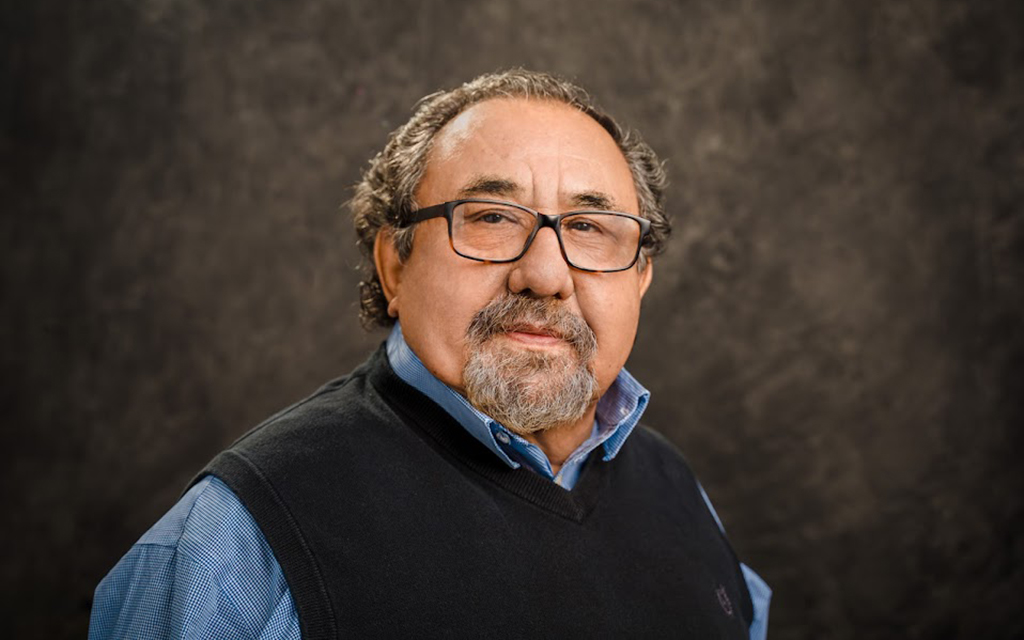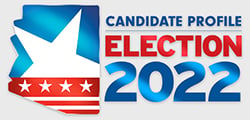
Raúl Grijalva (Photo courtesy of the Raúl Grijalva campaign)

Political affiliation: Democrat
Position sought: U.S. representative in 7th District
Age: 74
Career: Community organizer; member of the Tucson Unified School District board; Pima County supervisor
Website: standwithraul.com
Raúl Grijalva is running for the 11th time to represent southern Arizona in Congress – only this time, it’s in a new district.
The 7th Congressional District, redrawn to reflect the 2020 census, takes in the southern portion and southwestern corner of the state. It shares nearly 350 miles of border with Mexico and includes the tribal nations of the Cocopah, Pascua Yaqui, Quechan and Tohono O’odham.
Grijalva previously represented the 3rd District, which extended south to the U.S.-Mexico border and west to the Arizona-California line, taking in Nogales and parts of Tucson. The redrawn district also includes Tolleson, Bisbee and Douglas.
“Those are significant changes,” Grijalva said of redistricting.
He faces Republican Luis Pozzolo and write-in Republican candidate, Jeannette Garcia. He raised campaign funds totaling almost $426,000 in 2021-22, compared to less than $62,000 raised by Pozzolo, according to Federal Election Commission filings reported by OpenSecrets.org.
Since winning his first election in 2002, Grijalva has become one of the most liberal voices in the House.
“I think I’ve been consistent about my politics. People can put labels – liberal or whatever – but they’re progressive politics. I think they’re also commonsense politics.”
Grijalva is a longtime member of the Congressional Hispanic Caucus and former chair of the Congressional Progressive Caucus. He also chairs the House Natural Resources Committee and is a member of the Committee on Education and the Workforce.
During the 116th Congress, from 2019-21, Grijalva was the longest-serving member of Arizona’s congressional delegation.
Grijalva talked about his candidacy and legislative priorities in an interview for Cronkite News.
Q: Why are you interested in this job?
“Because I know it. I think I represent the people, the constituents, consistently and assertively. I’m good at it.”
Q: What in your past work, political or volunteer experience makes you the best candidate?
Grijalva was a community organizer in Tucson before winning a seat on the Tucson Unified School District Governing Board, which he served for more than a decade. In 1988, he was elected to the Pima County Board of Supervisors, where he served for 15 years. He resigned in 2002 to run for Congress.
Grijalva was born and raised in the district he represents.
“I’m part of that district in a very intimate way, and so my care for the district is not just on a policy or political level, it’s on a personal level,” he said.
Q: What are the major issues facing Arizona?
Climate and water.
On his campaign website, he says Arizona is disproportionately affected by climate change, which has brought increasingly worse heat waves, droughts and wildfires.
The state needs to move away from fossil fuels and begin to build a green economy based on renewable energy, he said, and state officials need to do more to prepare for a future in which water is more scarce.
“Unfortunately, the state leadership – beginning with the governor and the state Legislature and the agencies the governor controls – have put their heads in the sand and ignored the water crisis that we have in the state.”
Q: What will be your top priorities if elected?
Grijalva’s website lists more than a dozen policy objectives, including the economy, education, the environment, health care, jobs, immigration and services for veterans, seniors and Native Americans. He also is on record as favoring reproductive rights, closing the gender pay gap and limiting the use of surveillance into private lives.
“Our policies reflect what we see as the future and I think what our constituency sees as the future – closing the opportunity gap, investing fully in education and children in this country, confronting climate change and an equitable tax system that is fair and doesn’t just give the top 1 to 5% all the tax breaks in the world.”
Protecting civil liberties, including voting rights, is another primary area of concern.
“A person (going) into the booth to vote against me because they disagree with me should have the same right as the person going into the booth that agrees with me. That’s as simple as that.”
Q: How will you work to improve bipartisanship in politics?
Bipartisanship is difficult when “Republicans nominate extremist candidates because they see compromise and consensus as the enemy,” he said.
Grijalva said that, in the past, he has been able to negotiate with Republicans, such as former Arizona representatives Jim Kolbe and John Shadegg and former Sens. John McCain and Jeff Flake.
“I can’t do that anymore. There is no middle ground. They’ve weaponized – if you’re not with me, you’re against me, and us versus them. Democrats seeking a middle ground are rebuffed time and time again.”
Q: Do you have any concerns about the security of our elections?
In a statement issued on the first anniversary of the Jan. 6, 2020, attack on the Capitol, Grijalva called the insurrection “a calculated conspiracy to overthrow our democracy. It was a fascist attempt to, by force and lies, overturn a legitimate election. This violent, failed coup was sanctioned by a sitting president, aided and abetted by members of Congress and other elected representatives, all of them members of the Republican Party.”
He said in an interview that extremist groups continue to “plot to establish a form of government that relies on fear and lies to secure power for a minority of Americans at the expense of the rights and voices of the majority.”
Grijalva also has been an outspoken proponent of expanding voting access. Last year, he voted in support of the John R. Lewis Voting Rights Advancement Act that would have blocked discriminatory voting practices and made it easier to challenge voter suppression laws. The bill passed the House but did not come to a vote in the Senate.
In a statement his office issued at the time, Grijalva said, “In far too many states across our country, including Arizona, the fundamental right to vote is in a constant state of erosion. This year alone, 18 states have enacted 30 laws restricting the right to vote. … All in all, these efforts have had a chilling effect on our voting laws and the confidence of the American people in our democratic system.”
Q: What should be done, if anything, about border security?
Grijalva has called for an end to what he calls wasteful spending on a border wall “that has devastated precious environmental habitats, militarized border communities and destroyed sacred Native American cultural sites.”
And he recently called for the Senate to pass the Dream and Promise Act, which would grant conditional permanent resident status for 10 years to immigrants who entered the United States illegally as minors.
“Republicans continue to push for xenophobic, America First policies, whitewash history and demonize immigrants, while Democrats want to build an immigration system that is fair, humane, and reflective of our immigrant values,” he said in a statement supporting the act.
Q: Please share a quote or advice that you live by.
Grijalva paused before talking about a song in Spanish that centers on a horse race and how his dad quoted one line.
“He would say all the time, ‘It’s not always about finishing first. But you got to know how to finish.’ I think that’s one of my mottos.”
